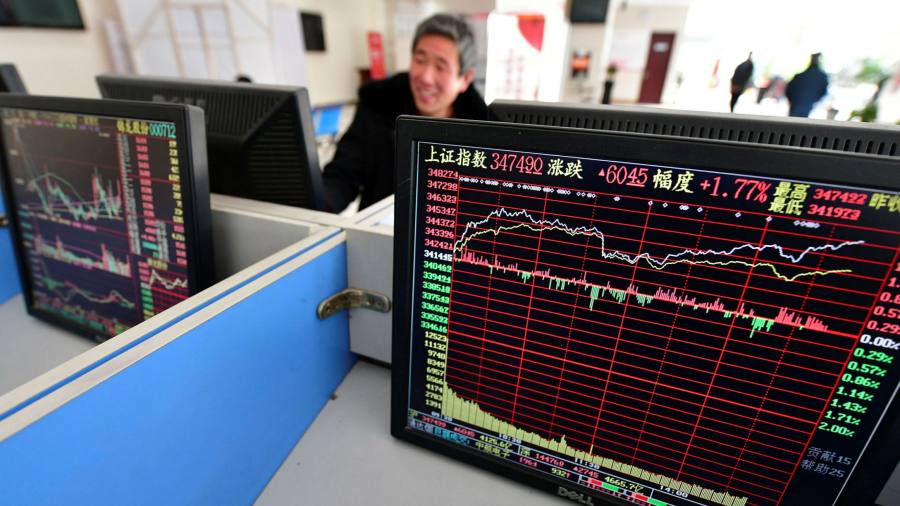[ad_1]
China’s mutual fund industry assets surged 48 per cent to a record $3.1tn (Rmb20tn) in 2020 but huge demand for new funds is stoking fears that volatile investor inflows could spur a stock market bubble.
China is expected to develop into the world’s second-largest asset management market after the US this decade, providing a huge growth opportunity for investment managers.
UBS forecasts mainland mutual fund assets could reach $16tn by 2030. Assets held in US mutual funds currently stand at about $23tn.
New fund launches in the US and Europe often struggle to attract investors who refuse to make commitments until a three-year performance record is available and a $100m pot of assets established. However, the opposite is true in China where asset managers are struggling to satisfy demand for new products.
New mutual funds launched in China last year attracted net inflows of $389bn, up 90 per cent on allocations to debuts in 2019, according to Z-Ben, a Shanghai-based consultancy that also tallied the rise in the country’s mutual fund industry from $2.1tn to $3.1tn.
Demand was particularly strong for balanced funds that invest in both stocks and bonds where allocations to new launches reached $250bn, up from just $36bn in 2019. Newly launched active equity funds pulled in $36bn, up from the $5.7bn, according to Z-Ben.
About 80 per cent of the total net inflows (excluding money market funds) gathered by Chinese asset managers last year was captured by new launches. But retaining the cash can also be problematic.
“Hyperactive fund churn is a feature of the onshore investment industry,†said Peter Alexander, Z-Ben founder.
Trading on mobile phones is helping drive frenetic inflows and withdrawals as investors often take profits swiftly on early gains from a new launch and jump into another product debut.
Z-Ben estimates that between 20 per cent and 30 per cent of the cash raised by new active equity funds is redeemed within six months.
Investor appetite for new funds has continued in the opening weeks of 2021 with managers seeing massive oversubscriptions ahead of launch day.
E Fund Management shattered the fundraising record for a Chinese manager after receiving orders worth $36bn in a single day for its newest product — the E Fund Competitive Advantage Enterprise Balanced fund. It was capped at $2.3bn.
Mr Alexander said that level of interest was “not an isolated event†as a further 15 funds had also sold out in a single day in January.Â
New active equity funds launched this month received subscriptions worth $57.8bn by January 19 but actual capital raised was limited to $27.8bn by managers. That is because more managers are imposing tighter limits on subscriptions and rejecting big-ticket orders to try and control the fever among retail investors.
Whether such measures will work is unclear because regulatory changes are pulling in the opposite direction.
Kelvin Chu, an analyst at UBS in Shanghai, said tighter rules covering wealth management products sold by banks and wealth managers have encouraged more retail investors to invest their savings in mutual funds.
“We expect more household financial assets to shift into mutual funds over the long term,†said Mr Chu.
CrossBorder Capital, a London-based consultancy, estimates that China alone supplied almost one-third of the $22.7tn surge registered in global liquidity in 2020 as central banks turned on the monetary taps to prevent the coronavirus pandemic destabilising financial markets.
“High liquidity ratios are associated with future increases in equity prices,†said Michael Howell, founder of CrossBorder. It is recommending China A shares as a “buy†to clients.
A senior adviser to China’s central bank warned this week that the risk of asset bubbles would increase if monetary policy was not tightened. The comments by Ma Jun, a member of the monetary policy committee of the People’s Bank of China who has also worked at the World Bank and IMF, followed a 34 per cent rise for Shanghai’s stock market composite index since its 2020 low in late March.
The tech-focused ChiNext index has rallied 49 per cent over the same period, drawing in retail investors.
“The PBoC clearly is worried about bubbles, given Ma Jun is speaking openly about it. The rally in Chinese stocks has been alarming and [the equity market] looks exposed if the vaccine rollout doesn’t go smoothly,†said Freya Beamish, chief Asia economist at Pantheon Macroeconomics, the consultancy.
[ad_2]
Source link






